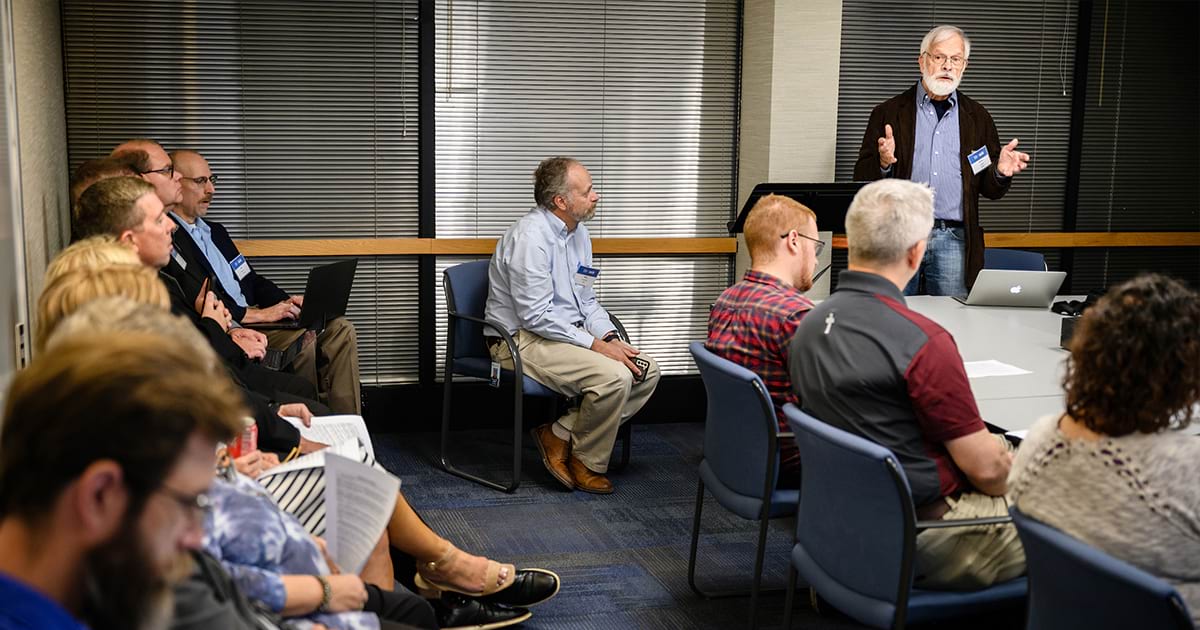
By Sarah Reinsel
How do we remain awake to confess Christ in a world asleep?
The Lutheran Church—Missouri Synod’s (LCMS) recent Making Disciples for Life (MDFL) conference, titled “Let Us Keep Awake,” took up this question in presentations and roundtable discussions held Oct. 10–12 at the LCMS International Center in St. Louis. A total of 301 people attended in person and online.
“The [MDFL] conferences are always insightful. … The Synod is reaching out in many avenues,” said the Rev. Jeff Nehrt, pastor of Our Redeemer Lutheran Church in Greenville, Ill. “It’s a great time to meet one-on-one with the presenters.”
The conference theme was based on St. Paul’s words in 1 Thess. 5:6: “So then let us not sleep, as others do, but let us keep awake and be sober.” Presentations focused on three main subject areas: awake as witnesses, awake for our slumbering neighbors and confessing Christ in a world asleep.
In the opening devotion, the Rev. Dr. Mark Wood, director of LCMS Witness & Outreach Ministry, encouraged attendees to “keep awake to the challenges of being faithful in a very complex world.” Each session of the conference was geared toward equipping Lutherans to respond to opportunities to share God’s Word with people who have been deceived by unbiblical worldviews.
“How will we respond as a church to such encouragement, challenges, opportunities?” asked the Rev. Kevin D. Robson, LCMS chief mission officer, in light of St. Paul’s words to the Thessalonians. “By continuing to point people only to Christ, crucified for our sins, raised for our justification. He is our forgiveness, life and salvation, truly the world’s only hope. And so we always get back around to the business of proclaiming Him wherever we go and to whomever we meet.”
A Lutheran response to contemporary ideologies
Presentations ranged from lectures on cultural Marxism, critical race theory and social justice, to practical sessions on lifelong catechesis and Christian education. Thirty-six different presenters spoke over the course of the three-day conference.
“Our Synod has a whole lot to offer from both clergy and lay people out there who know a lot about things that are going on in the church and in society,” said the Rev. Heath Curtis, coordinator for LCMS Stewardship Ministry. “And [through this conference], the [LCMS] Office of National Mission can be a hub for people to make connections and get the information they need to do godly, effective, confessional Lutheran ministry out in the world.”
Plenary and breakout sessions offered a Lutheran framework for addressing contemporary ideologies and offered ways of properly understanding the role of the church in the world.
In his plenary, “‘Critical Race Theory’ — A Destructive Reframing of the Problem of Racism and Its Solutions,” the Rev. Dr. Gregory Seltz, executive director of the Lutheran Center for Religious Liberty in Washington, D.C. made the case that “critical race theory is the wrong framing of a real problem, with secular-statist solutions that … create dependency, not liberty.” Seltz advocated instead for Luther’s Two Kingdoms approach as the way to understand the mission of the church on earth, and emphasized a “biblical framework of human value, human sin and Christ-earned hope.”
The Rev. B. Keith Haney, in his breakout session, “A Christian Response to Racism,” addressed the role of the church in dealing with racism. “The key to how we deal with racial issues in our country is to understand that the church has a power that no one else has,” said Haney. “We have the power of forgiveness, we have the power of love, and we have the power of grace.”
The Rev. Dr. Jeffrey Kloha, chief curatorial officer of the Museum of the Bible, gave a plenary on Philippians, “the most political of the Apostle Paul’s letters.” Kloha explained how Paul’s imprisonment in Rome, and the epistles he wrote during his imprisonment, defended and even advanced the Gospel. Paul’s confidence in the Gospel in the face of persecution by the Roman empire, Kloha argued, should serve as an example for how the church should act in a world hostile to it.
“How do people recognize us? What do people see in us? When they hear from us, what do they hear?” Kloha asked at the end of his presentation. “If it’s not Christ and Him crucified, then I’d suggest we’re departing from the way the church is given to preach the Gospel.”
Taking knowledge back into the field
Attendees and presenters alike expressed that this conference was refreshing and useful for their work back in their home congregations.
“Everything that has to do with making disciples, I’m up for it,” said the Rev. Juan Zamora, president of the Hispanic National Convention. Zamora spoke on “Sharing the Gospel in a Pluralistic Hispanic Culture.”
Kris Ficken, a member of Beautiful Savior Lutheran Church in Plover, Wis., found the presentations on life issues helpful for her work with her local pregnancy resource center.
“All the talks, especially the talks on the post-Roe world, show us the opportunities we have out there and the responsibilities we have as Christians and followers of Jesus — how do we help those in need and spread that Word of life?” Ficken said.
The next MDFL conference, which will have a Life Ministry emphasis, is scheduled for March 2–3, 2023. Selected sessions from October’s conference, as well as from past conferences, will be available online at the MDFL Resource Center. The resource center is a growing database of material for congregations and individuals alike to use as they seek to evangelize the lost, retain the faithful, strengthen congregations and plant churches and schools.
Posted Oct. 31, 2022/Updated Nov. 1, 2022





I am so very grateful to have such a committed group of church clergy who are answering God’s call to minister to this crazy world we live in. It excites me to know that what I need to disciple others is being taught by my church.